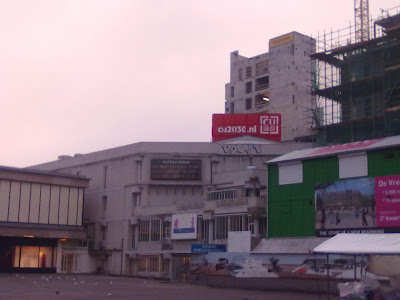It is always difficult to explain a halt, a gap, a missing voice. I guess these are the moments when life takes over. This summer I was taken back to mine. I had to change a bit its course and here I am typing from Newcastle upon Tyne, which, I have discovered on road signposts, in English is understood as just: the NORTH. I guess, meaning far. Being displaced (from London) and the biggest uprising that has been seen in its latest history might have been distracting, and disappointing for me, but maybe it would also bring the new variety of this blog posts and meandering. I have no intention and no capability to represent here what happened the latest months in terms of understanding, representing and demising the corporation worldwide. Thus, I will just start with sharing my latest impressions and bad phone pictures, until I gather the money to develop analogue camera films. Alas. Debris.
Utrecht's main square. Redevelopment of the Music Hall
Abandoned site in Beogradska Street, Belgrade
I have recently been in the Netherlands and Serbia. How utterly different, different, but same crisis felt on both locations! Not to mention the famous 99% ,but we all know how much of a mainstream this blogger can be in Britain in this moment.

Well, in his home coutry, which is imho closest follower of british economic austerity measures in culture sector, he seems to be already a media star. I feel almost sorry for myself for not being consistent in writing this one. I guess the streets took me away from it. In praise for what Jean-Luc Nancy calls 'divine writing' here is my return to recording in words the daily thoughts on our daily existence under the requiem for corporation. On 'Ereignis' next time!
Newcastle has many bridges. They are the basics of its daily functioning. This sign is usually put at their ends we all know for which purpose. I wonder how humanistic would it be to put it on the office skyscrapers nowadays.
Solidarity,
t
t








